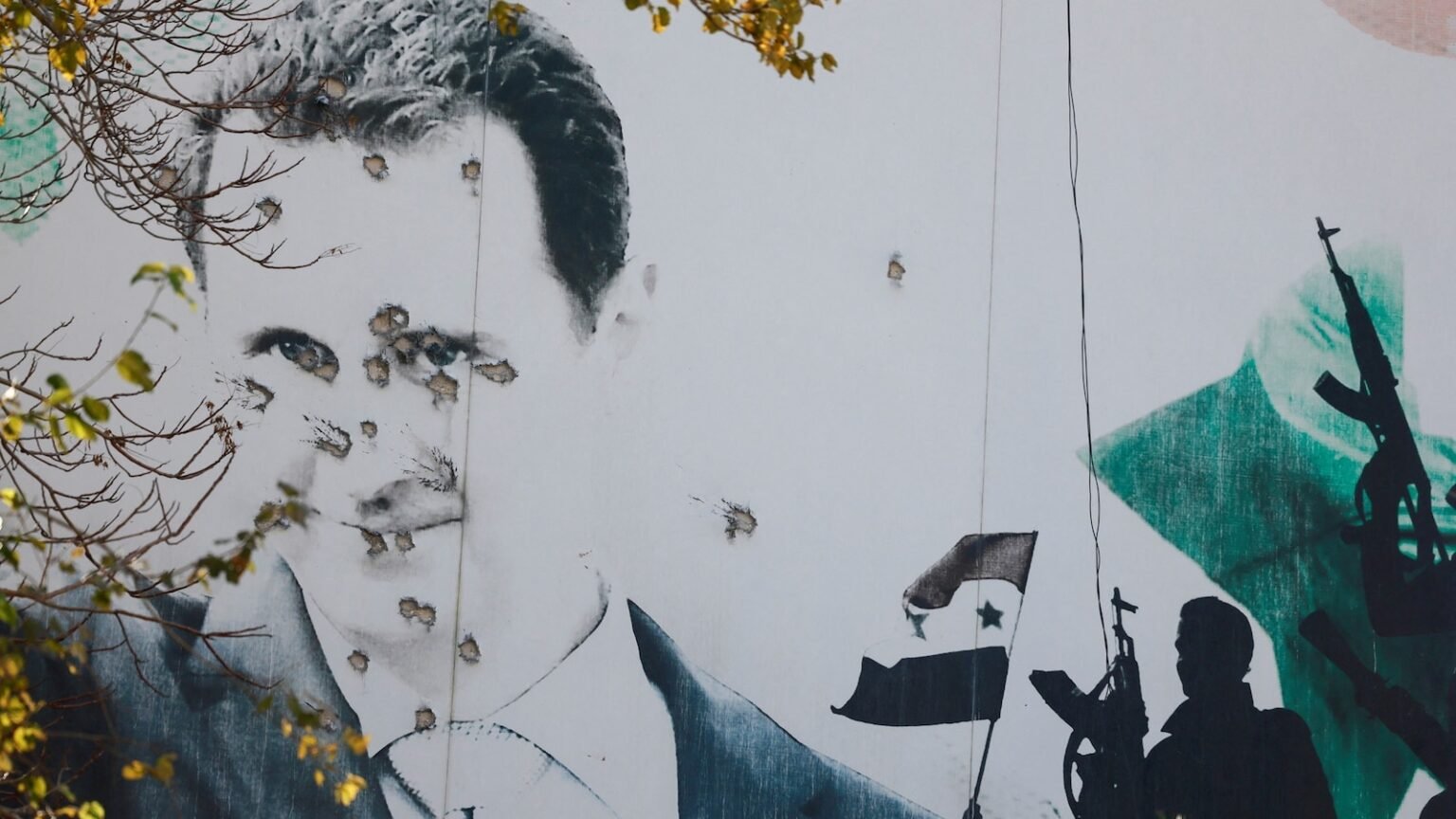LONDON — The former Syrian President Bashar Assad made his first official statement on Monday since he was ousted by a rebel offensive and fled the country for Russia, saying he had left Syria after being asked to do so by Moscow.
“My departure from Syria was not planned, nor did it happen in the last hours of the fighting,” Assad said in a statement attributed to him and published on the presidency’s official Telegram channel.
“As terrorist forces infiltrated Damascus, I went to Latakia to supervise combat operations in coordination with our Russian allies,” Assad said.
“On arrival at the Khmeimim airbase in the morning, it became clear that our forces had completely withdrawn from all battle lines and the last army positions had fallen,” the statement continued.

A poster with a photo of former Syrian President Bashar Assad shows bullet hole damage after his ouster in Damascus, Syria on December 16, 2024.
Ammar Awad/Reuters
“As the situation in the surrounding area continued to deteriorate, the Russian military base itself came under increasing attack by drone strikes. With no viable means of egress from the base, Moscow requested that the base’s command arrange an immediate evacuation to Russia.”
“This happened a day after the fall of Damascus, after the final fall of military positions and the resulting paralysis of all state institutions,” Assad said.
“At no point in these events did I consider resigning or seeking refuge, nor did any individual or party make such a proposal,” Assad said. “The only initiative was to continue the fight against the terrorist attack.”
“At no point in these events did I consider resigning or seeking refuge, nor did any individual or party make such a proposal,” Assad said. “The only initiative was to continue the fight against the terrorist attack.”
Assad did not comment on long-standing allegations that his regime committed gross human rights abuses during its 24 years in power, abuses that opposition forces, human rights groups and foreign governments only escalated after civil war broke out in 2011.
The fall of his regime saw jubilant fighters and residents empty Assad’s prisons. More than 100,000 people are still believed to be missing, having disappeared into Damascus’ vast and opaque security apparatus.
The leader of the Hayat Tahrir al-Sham rebel group, which led the surprise offensive south of Idlib towards Damascus, vowed that the transitional government would hold those involved in Assad’s human rights abuses to account.
Ahmed al-Sharaa — also known by his nom de guerre Abu Mohammed al-Jolani — said shortly after the fall of Damascus: “We will not hesitate to hold accountable the criminals, murderers, security and army officers involved in torturing the Syrian people.”
As Assad’s statement was released, rescue workers were entering a suspected mass grave found on the outskirts of the capital. The area was under military control and access to it was closed to civilians. A delegation from the United Nations, on the other hand, was visiting the villain Saydnaya prison in the capital
In Monday’s statement, Assad described himself as a leader who “from the very beginning of the war refused to trade the salvation of his nation for personal gain or compromise his people for many offers and inducements.”

Members of Syria’s White Helmets civil defense prepare to transport shrouded bodies from a mass grave in Damascus on December 16, 2024.
Mohammed Al-rifai/AFP via Getty Images
As the former president said, “he was next to army officers and soldiers on the front lines, just a few meters from terrorists in the most dangerous and intense battlefields”.
“During the darkest years of the war,” Assad said, “he was a leader who did not leave but stayed with his people with his family, facing terrorism under bombing and recurring threats from terrorists who entered the capital during the fourteen-year war.” “
“I have never sought a position for personal gain, but I have always considered myself the guardian of a national project, supported by the faith of the Syrian people, who believed in his vision,” he added. “I have had a constant conviction in the will and ability to protect the state, to defend its institutions and to sustain their options until the last moment.”
“When the state falls into the hands of terrorism and the ability to make a meaningful contribution is lost, any position becomes meaningless, leaving its occupation meaningless,” said the former president.
“This in no way diminishes the deep feeling of belonging to Syria and its people, a bond that remains unshaken by any position or circumstance. It is a belonging filled with hope that Syria will once again be free and independent.”
ABC News’ Somayeh Malekian, Ghazi Balkiz, James Longman and Joe Simonetti contributed to this report.

